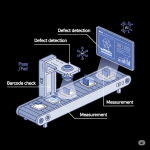Pitching a tech product to an industrial client is not like pitching to a fellow startup or a VC.
Industrial clients operate in a world of long sales cycles, risk aversion, technical scrutiny, and a deep focus on operational continuity. Startups that don’t understand this reality often blow their first impression — and never get a second shot.
This article breaks down the most common mistakes startups make when selling to industrial clients, and how to avoid them.
❌ 7 Mistakes Startups Make (and How to Avoid Them)
1. Talking Features Instead of Value
Startups love their product’s features — AI-powered this, blockchain that — but industrial clients don’t care unless it solves a real problem in their workflow.
✅ Focus on outcomes: uptime, cost savings, safety improvements, compliance, or process speed.
2. Not Understanding the Client’s Operations
Many startups pitch without fully understanding how the factory, plant, or system actually works. That kills trust quickly.
✅ Spend time on the shop floor. Ask detailed questions about current workflows. Show that you understand the environment you’re selling into.
3. Lack of Proof or Traction
Industrial buyers are skeptical by nature. If your product doesn’t have real-world traction — pilots, benchmarks, case studies — it’s unlikely to move forward.
✅ Bring proof. Even a small pilot with measurable impact is worth more than a polished deck.
4. Overcomplicating the Message
Technical buyers already deal with complexity. If your explanation is overloaded with jargon, they’ll tune out — or assume you don’t understand your own product.
✅ Use clear, simple language. Assume your audience is smart, but busy.
5. Ignoring Integration Requirements
Industrial systems are messy: legacy software, air-gapped networks, compliance regulations. If your product can’t integrate easily, it’s a nonstarter.
✅ Address integration directly. Offer support, APIs, protocols (like OPC-UA, Modbus, etc.), and a deployment plan that minimizes disruption.
6. Forgetting the Buying Process Is Slow (and Political)
Startups often expect quick decisions, but industrial procurement involves layers: engineering, operations, finance, sometimes government or board-level approval.
✅ Map the decision-makers. Be prepared for a long sales cycle. Build champions within the organization.
7. No Clear Next Step
Even if the pitch goes well, many startups fail to define what happens next: demo, pilot, trial period, or technical validation.
✅ Always end with a strong, actionable next step:
“Would you be open to a 30-day pilot on one line?” is better than “Let me know if you’re interested.”
💡 Bonus: What Industrial Clients Do Want
- A solution to a clearly defined operational pain point
- A company that understands compliance, uptime, and support
- A low-friction way to test the product before committing
- Confidence that you’ll still be around in 12 months
✅ Final Takeaway
Industrial clients aren’t just looking for innovation — they’re looking for reliable partners who can improve performance without introducing risk. If you want to succeed in this space, don’t just pitch your product — pitch your understanding of their world.






